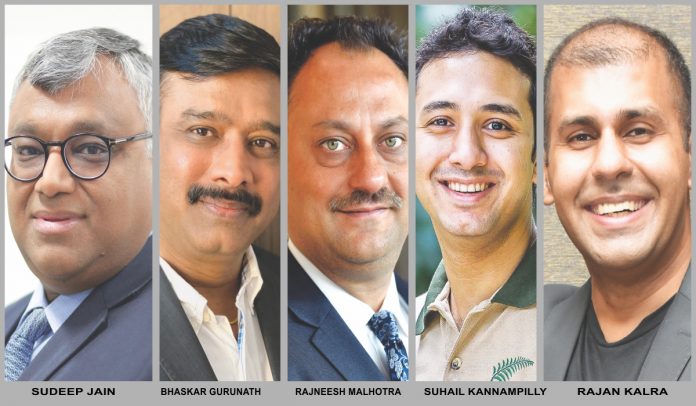Bringing sustainability to the fore, a rising number of hotels are investing in EV charging infra – a move that aligns people, profit, and planet in perfect harmony.
Lipla Negi
The next time you drive into the thick greens of Jim Corbett National Park, chances are that you will find an EVCS before you spot a tiger. Set amidst the wildlife, GenX Corbett Tiger Den by Suba Group of Hotels is among the growing tribe of hotels to operationalise an electronic vehicle charging station (EVCS) on its premises. With the intensity of the pandemic lessening, the hospitality industry is seeing a rising number of hotels turning to sustainable methods as a strategy to cut costs and survive through the tough times. However, of late, for many brands, it has turned into a ‘conscious choice’ to encourage travellers to drive the change rather than a customary CSR activity. The surge in domestic tourism, coupled with the growing demand for electric vehicles (EVs), offers an opportunity for business growth in an ever-evolving industry that has never shied away from embracing innovative ideas.
“The industry thrives on building an aspirational environment for guests and influencing customer preferences. Hotels have played a role in the adoption of lifestyle changes for each generation. By investing in sustainable processes, such as EVCS, solar technology, water conservation, and recycling, it also serves to showcase how these changes can be implemented in our daily lives,” said Rajneesh Malhotra, Chief Executive Officer, Chalet Hotels.
From shunning single-use plastic to recycling waste and water, sustainability has spread like wildfire in the industry. So much so that responsible tourism is not just a trend anymore. It has taken the form of a movement wherein the stakeholders and travellers share the responsibility of protecting the planet. While some sustainable methods are personal choices, a few are needed by the hour. Touted to be the next big thing in the automobile industry, EVs are drawing more attention than ever. Sensing their potential in the near future, the hospitality industry has started prepping for it. In 2021, several big names in the country announced their interest and investment in EVCS infrastructure.
Ingenious business move
According to research by the Centre for Energy Finance based on Vahan Dashboard data, 5,000 four-wheeler EVs were sold in 2021, the highest in four years. So one can fairly see that developing EV charging infrastructure is a well-calculated move for hotels. More than a ‘green quotient’, the easy availability of EVCS within the hotel premises will help cater to, retain, and attract the well-heeled and travelled clientele of such hotels. Predictably, a growing number of hotel chains are stepping up their game in this direction. As customers switch to cleaner sources of energy, these EVCS are sure to become a necessity in the near future.
Installing an electronic vehicle charging point in the hotel premises is a move that helps embrace sustainability, conveniently as well as profitably, since it is a low-to no-cost investment and brings revenue too. Drive-in destinations, especially those on highways or in close proximity to cities, will be big gainers. A typical DC fast EV charging session lasts for 45 to 60 minutes—sufficient time for customers to have their meals during breaks at hotels. At popular tourist destinations, the hotels offering EV charging facilities could also become the base to explore the nearby attractions.
“The EV charging facility for customers is becoming a huge value addition for hotels on highways and in cities. The customers utilising EV charging solutions will also lead to more sales for hotels through the food and beverage category during their stay,” said Maxson Lewis, Managing Director, Magenta, an Indian Charge Point Operator (CPO) company.
Catalyst for change
Recently, we have seen some big players make a strategic investment in EV charging infrastructure. While IHG Hotels & Resorts announced a partnership with SunFuel in India, Marriott International signed an MOU with Convergence Energy Services Limited (CESL) to install EV charging units across 37 Marriott International hotels, which will gradually expand to 100 hotels in a year. Jumping on the EVCS bandwagon, the amã Stays & Trails collaborated with Tata Power to install EV charging points at 30 of its villas and heritage bungalows across 11 destinations. There are more names being added to the list as we write, and things continue to roll.
It is surely a step forward in catering to the evolving needs of environment-conscious consumer customers who wish to reduce their carbon footprint while travelling as well as cut their fuel expenses. Speaking about building a robust EV ecosystem, Mahua Acharya, MD and CEO, CESL, said, “Developing a sustainable landscape with supporting EV infrastructure is the key to cultivating consumer confidence in EVs. We are expecting to reduce pollution emission levels, leading to cleaner air and various public health benefits.”
Foresight is a virtue in the hospitality business, and the hotel chains investing in EVCS infra are quick to identify the value addition this investment brings to their brand image and loyalty. Here we spoke to some of the first few hotel chains to operationalize EVCS on their properties vis-à-vis EV infra and how it helps kill two birds with one stone—sustainability and competent business strategy.
Journeying to Tomorrow
Sudeep Jain, Managing Director-South West Asia, IHG Hotels & Resorts, said, “With a massive footprint across the globe, we recognise the important role the tourism and hospitality sectors play in working towards a sustainable future. As one of the world’s leading hotel companies, we embrace our responsibility and opportunity to make a positive difference and help shape the future of responsible travel.”
“Our 10-year plan—Journey to Tomorrow—launched last year is to make a difference to our people, communities, and the planet. This includes our support of efforts to care for the environment, and through a recently announced partnership with SunFuel in India, a prominent EV charging company, we are helping our guests make a positive contribution to environmental sustainability. Through this initiative, guests who drive electric vehicles will be able to plug their vehicles into the charging spots and top-up their batteries across our hotels in the country whilst enjoying hotel facilities and the best-in-class service that we are known for. We understand that EVs are a growing segment in India, and destination charging will be key to catalysing the easy transition and adoption of EVs in the country and empowering conscious travellers. Our initiative of providing EV charging amenities across our portfolio will attract the growing segment of EV drivers to our hotels. With an expanding portfolio of hotels in India, we know we can enable a positive change and we are proud to be working with partners such as SunFuel who share the same vision. We believe that sustainable hospitality is the future, as our guests have also evolved and are more mindful than ever about travelling responsibly. We are happy to complement the needs of a responsible traveller by offering such facilities across our hotels,” he added.
Charging infra will be a necessity
“In the next couple of years, we anticipate that this charging infrastructure will be a necessity and not a USP any longer. It would most definitely impact the services we offer, as people would look for smart and comfortable options to spend time while their cars are charging. With a whole gamut of added services on offer such as F&B, wash and change rooms, spas, and health clubs, guests will engage which will eventually lead to higher sales. This service also offers a great opportunity to build guest satisfaction and loyalty,” said Bhaskar Gurunath, Area Director of Engineering, South Asia, Marriott International.”
Gurunath added “We look at these chargers as a catalyst for the transition from internal combustion engines to EVs, which supports our sustainable objectives as well. We consider it a smart business move as we encourage EV users to make productive use of their time while their vehicles are charging, by using our restaurants, meeting rooms, or even the services of our fitness centers, spas, or salons. Our choices are going to clearly define and structure the tomorrow that is to come. Encouraging and moving to an EV-based mode of transport is a significant step towards supporting a sustainable future for the next generation. At Marriott International, with our expanding global presence, we have a greater obligation to operate responsibly. While integrating sustainability across our value chain and mitigating climate-related risk, we are working towards reducing our environmental impacts, building and operating sustainable hotels, and sourcing responsibly.”
It helps prioritise sustainability
Although the EV business is still at a nascent stage, it is imperative to create more charging stations and battery switching facilities in urban and rural areas. These steps will make it easier to use EVs since many travellers prefer road trips and long excursions in private vehicles, as per Malhotra.
“The adoption of EVs is gaining momentum as governments push citizens to switch to EVs, thereby necessitating the development of charging infrastructure. Charging stations will soon be on the ‘must-have’ list of all hotels as more and more people will be driving EVs. Installing charging stations will not only be a ‘smart business move’ but also a step in the right direction from the ‘sustainability’ perspective,” he said.
“Today’s consumers and shareholders prioritise sustainability and choose to partner with businesses that are doing social or environmental good. Chalet Hotels is a signatory to Climate Groups’ EV100 initiative and will be installing EVCS at all its properties by 2025. We have not worked on the commercials yet, but our endeavour is to encourage people to adopt EVs by providing EV charging facilities at a reasonable cost,” he added.
Mandatory for five-star hotels
Suhail Kannampilly, Chief Executive Officer, Concept Hospitality (The Fern Hotels & Resorts) said, “Business that focusses on sustainability is smart business. I see this becoming mandatory for all hotels in five years. The price point for the charge currently varies from state to state as power costs are different. We do not provide this as a complimentary service, but the rates are not much higher than commercial electricity charges. Customised packages as well as listings of the available facilities for guests are in progress. We recently collaborated with Autocarindia and Audi to organise the first EV drive through a national forest at Sasan Gir, Gujarat. The cooperation from the forest department was brilliant to see. It also paves the way for a future where our forest only allows non-emitting vehicles.”
Growing visibility on search engines
Rajan Kalra, Director-Sales, Suba Hotels & Resorts, averred that the Suba Group is the first pan-India hotel group to operationalise EVCS on their premises. While your vehicles are getting recharged, you can avail customised F&B offers. The benefits of EVCS are greater than one. First, it helps attract EV owners. Second, with the low supply and increasing demand, having this amenity will increase visibility on search engines.
He added, “Through the EV charging mobile app, power companies provide EV owners the ease of locating our hotel charging stations on aerial maps. Consumers increasingly expect ‘green’ options, and hotels must become champions for climate mitigation.”
This generation is the turning point for almost all industries on a global scale as they are tech-savvy, accustomed to convenience, and passionate about environmental preservation. Car manufacturers are working hard to make electric vehicles affordable for millennial and Gen Z drivers since the price of EV batteries dropped 50 per cent between 2010 and 2016. When you consider the rapidly approaching deadline for the sale of traditional diesel and gasoline vehicles, it is easy to see why the hospitality industry needs to act now to serve millennials and Gen Z.
There will come a time in the not too distant future in which EVs outnumber traditional cars, and accommodating this global evolution will be a key to the success of the hotel business.






